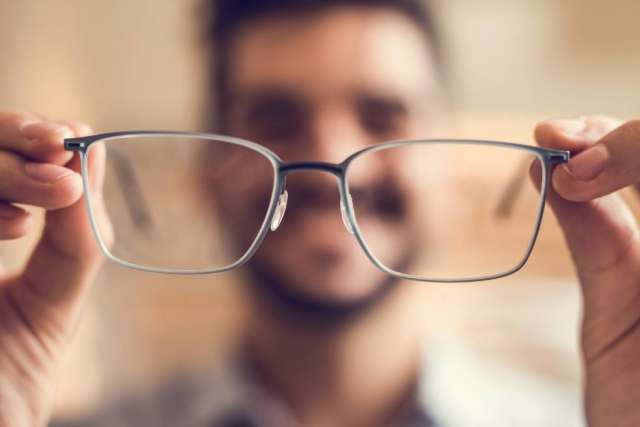Prescription eyewear can be costly — and it may not be necessary. Over-the-counter (OTC) reading glasses are a fraction of the cost and might offer enough magnification to bring things into focus for you.
But before you go shopping for OTC specs, gather the facts about how aging affects your eyes and the best way to address the problem:
Why does eyesight get worse with age?
Trouble seeing clearly at close distances, a condition called presbyopia, is one of the most common problems people develop between ages 41 and 60 — it affects nearly 80% of North American adults ages 45 to 55. As you age, the lenses in your eyes lose their flexibility, making it harder to focus on print or objects up close.
How do you know you’re experiencing presbyopia? Signs include:
- Frequent headaches after reading
- Holding reading material farther from your eyes to see it clearly
- Print appears blurry, especially in dim lighting
- Tired or sore eyes
Close focus may be one of many eye issues you experience as you age. Dry eyes, increased glare (especially while driving at night) and trouble distinguishing between colors are all age-related symptoms.
Should you use over-the-counter reading glasses?
For many people, readers offer an easy and affordable solution for presbyopia. OTC glasses are essentially magnifying glasses — they come in various strengths ranging from +1.00 to +4.00 to make print appear bigger. These reading glasses won’t worsen your eyesight; they may even have the opposite effect. When your eyes struggle to focus, you blink less. Without enough blinking, your eyes can become dry and irritated.
But before you run to the drugstore for new readers, see an eye doctor (optometrist) first to ensure OTC glasses will help with your vision. An optometrist can tell you the best magnification level for your current eyesight. You may need prescription glasses if each eye requires a different strength or if you have astigmatism (the eye’s lens isn’t perfectly round).
A comprehensive eye exam can also ensure there are no other eye problems. You may be at increased risk for serious vision problems if you have:
- Diabetes, which increases the risk of developing eye-blinding diseases
- Family history of glaucoma or macular degeneration
- Health conditions requiring ongoing medications — some medications, including antihistamines, can affect your vision
- Visually demanding job
Tips for choosing OTC reading glasses
Reading glasses are available everywhere. But it’s not as easy as grabbing the first pair you see. Choose the wrong ones and you could end up with additional eye strain or headaches.
Take these steps while shopping for OTC reading glasses:
- Consider when you’ll be wearing them: Think about when you’ll be using the glasses. Using them all day while working on a computer may require less magnification than using them to thread needles as part of your sewing hobby.
- Find the right power: Your eye doctor can determine the best strength for your eyes. If you haven’t had your eyes assessed yet, try on several pairs (starting with the lowest magnification first) to see which ones help you see clearly. If you’re between two different strengths, opt for the weaker glasses — lenses that are too powerful can cause discomfort and lead to eye strain or headaches.
- Test them out: Bring reading material from home or grab a magazine at the store. Take your time and read for a couple of minutes. The average person reads from 14 to 18 inches from their face, so hold it at that distance. Do the words come into sharp focus? Do your eyes feel tired after reading?
- Check for comfort: You’ll likely wear these reading glasses often, so they need to fit well. How does the weight feel? Are they too tight around your ears? Ensure the glasses don’t pinch your nose or feel like they’ll slide off. For a perfect fit, look for a pair with an adjustable bridge.
- Get more than one pair: Consider buying several pairs of reading glasses. That way, you can keep them where you need them or get different strengths depending on how you’ll use them.
If you’re buying reading glasses online, check that you’ll be able to return them if they don’t work. Order several pairs to try on at home and follow the same steps for evaluating the fit.
Signs you need to see an eye doctor
Every adult should have a yearly eye exam after age 50, according to the National Institute on Aging. People with diabetes should have an annual eye evaluation regardless of age. The exam should include dilation, which involves putting drops into the eyes to widen (dilate) the pupils, making it easier to see inside.
Some symptoms warrant a visit to the eye doctor between annual exams. Frequent headaches or eye fatigue — even when wearing reading glasses — may indicate that you are ready for a stronger prescription.
Warning signs of serious eye health problems include:
- Decreased peripheral (side) vision, a sign of glaucoma which occurs when the optic nerve is damaged
- Increased floaters (spots) and flashing lights in your vision, which could be a sign of a torn retina
- Seeing distorted images, such as straight lines appearing wavy, which can be a sign of age-related macular degeneration
- Sudden and frequent blurry vision, often a sign of diabetes or high blood pressure (hypertension)
If you’d like your eyesight checked or have noticed signs of a serious eye issue, reach out to your primary care physician or a UCLA Health optometrist.



